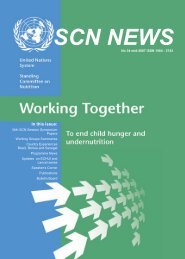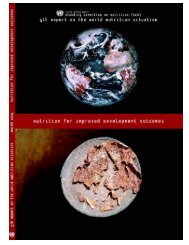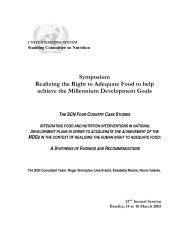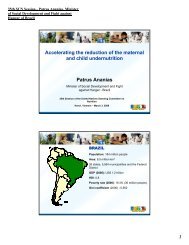Universal Salt Iodization (USI) - FTP Directory Listing
Universal Salt Iodization (USI) - FTP Directory Listing
Universal Salt Iodization (USI) - FTP Directory Listing
- No tags were found...
Create successful ePaper yourself
Turn your PDF publications into a flip-book with our unique Google optimized e-Paper software.
www.unsystem.org/scn FEATURES 57public food distribution programmes such as Mid Day Meal (MDM), Integrated Child Development Services(ICDS), and NGO special intervention programmes. In Ghana, women’s groups in the north are supplied withsalt by small processors and assisted by the project in transportation and packaging to ensure regularavailability of iodized salt at an affordable price among poor populations with the highest prevalence of iodinedeficiency. This has a dual advantage; smaller processors can carve out new markets for their product andaccess to iodized salt is created among the more vulnerable segments of the population.Achievements, lessons learned and remaining challengesThe efforts involved in WFP and MI’s initiative to work with and adjust inputs as well as technical support tothe specific, well defined needs of small and medium scale salt processors were much more difficult and timeconsuming than originally envisaged. This is in part due to the fact that many of these processors are not partof the formal economy and are sometimes reluctant to join a project that will effectively ‘formalize’ them.However, those who have joined have seen that the benefits and, most importantly, their income earningcapacity, outweigh the costs (e.g. taxation). This outcome has resulted in other salt processors seeking tojoin the programme. In retrospect, starting with a smaller number of processors and setting an example wouldprobably have made it easier to enlist processors who were initially reluctant.Clustering processors helps to bring down the costs of production and transport, thus putting producers in abetter position to compete in the market. It also facilitates quality control, which in turn makes it easier toaccess a market for the salt because quality can be assured. Linking up with government systems formonitoring and quality assurance and reinforcing those systems as much as possible is essential. In addition,working with groups of processors provides opportunities to help ensure better care of the labourers in termsof protective wear, water, sanitation and health insurance.Community ownership is an obvious and clear-cut criterion for success. In that context, it is also important toset clear criteria from the start as to which type of processors, in terms of production capacity, will be eligibleto join the programme. The criteria should ideally be set in a transparent and participatory manner to avoidmisunderstandings at the community level.Once engaged at this level of collaboration and support, one is faced with the question as to where to draw aline between engaging with small processors to get their salt iodized and a more comprehensive approach inthe realm of small and medium enterprise development work, which would lead to improving their overallbusiness performance. It is important to consider the small and medium processors as part of a larger systemthat is influenced by developments in government policies and the market. On that basis, a judgment callneeds to be made as to whether the small processors will remain in business long enough to make itworthwhile to engage with them. However, given the fact that their contribution to overall salt production isstill very big (e.g. in Pakistan they process at least 85% of the salt) and that promotion of and support to saltiodization efforts are relatively inexpensive, it has been deemed worthwhile even if on a shorter-term basis.ConclusionBy March 2008 a total of approximately 85,000 tons of iodized salt is expected to have been producedthrough this initiative – enough to meet the requirements of 42.5 million consumers. However, many challengesstill have to be met to consolidate and sustain the current achievements; such as: enhancing the selfregulatorymechanisms of salt producers, improving government capacity to monitor <strong>USI</strong> and enforce legislation,and ensuring sustainability of production of iodized salt by salt producers through improved competitivenessand creation of commercial procurement services of KIO 3 . However, even with these achievements <strong>USI</strong>cannot be achieved in the five countries described (Ghana, India, Pakistan, Senegal and Sudan), unless thesame support is extended beyond this initial experiment to include all eligible smaller salt producers.References:UNICEF (2006) The State of the World's Children 2007. Women and Children: The Double Dividend of Gender Equality.UNICEF:New York. (online)Contact: tina.vandenbriel@wfp.orgback to contents SCN NEWS # 35







